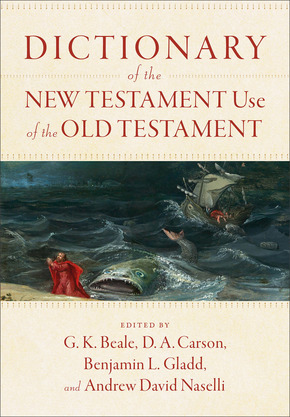
G. K. Beale, D. A. Carson, Benjamin L. Gladd, and Andrew David Naselli, Eds.
Reviewed by: Harrison Perkins
Dictionary of the New Testament Use of the Old Testament, edited by G. K. Beale, D. A. Carson, Benjamin L. Gladd, and Andrew David Naselli. Baker Academic, 2023. Hardcover 992 pages, $64.99. Reviewed by OP pastor Harrison Perkins.
One great tool for understanding Scripture deeply is biblical theology. This discipline seeks to trace how ideas, themes, and principles develop across the unfolding narrative of the Bible. For example, in Genesis 3:15, God promises that the seed of the woman would come to crush the serpent’s head. How did that seed theme grow, expand, and obtain new clarity as God continued to deliver new inspired writings to his people? For all these themes, Christ is ultimately the fulcrum in their fulfillment. He is indeed the direct fulfillment of many ideas and themes that are first announced in the Old Testament. Given that this discipline focuses on understanding Scripture as it progressively develops ideas and themes toward fulfillment, the way that the New Testament looks back to and interprets the Old Testament is a key feature.
The Dictionary of the New Testament Use of the Old Testament is an amazing reference work aiming to digest mountains of scholarly work from recent decades to provide entryway synopses about methods, approaches, themes, and doctrines as they have been considered from the biblical-theological vantage of how the Old Testament appears in the New Testament. This work, as a reference volume, is academic in nature and weighty in its content. It is as accessibly written as such a project can be, but, nonetheless, presumes some knowledge of what biblical theology is and intends to achieve. Many readers of New Horizons will not struggle on this front, but it is worth noting.
This book organizes into essays various aspects of the New Testament’s use of the Old Testament. In that regard, its format is less like succinct statements of definition in a dictionary and more like deeper and more conceptual entries in an encyclopedia. In some ways, the result is to condense the fruit of other research—for example, G. K. Beale and D. A. Carson, editors, Commentary on the New Testament Use of the Old Testament, Baker Academic, 2007—into cogent statements of analysis about those findings in biblical theology. These summaries, combined with each entry’s bibliography, are great starting places to understand numerous issues in biblical theology especially related to how the New Testament draws upon the Old Testament.
The five kinds of essays that this dictionary includes address 1) surveys of biblical books, 2) topics in biblical theology, 3) Jewish exegetical traditions, 4) inner-biblical exegesis, and 5) systematic theology.
The most informative type of essay, from this reviewer’s standpoint, concerns the Jewish exegetical traditions. The main benefit here is to survey how commentators before the New Testament and outside the Christian tradition have analyzed biblical theological development. The benefit, for me, is that this area of research is least familiar and least accessible. These entries provide true paths to get a quick handle on new but complicated material.
The essays on topics in systematic theology, although few, are typically very good. Interestingly, these essays provide the main contribution about Trinitarian theology in this volume. J. V. Fesko’s entry, “Bibliology,” and Kevin VanHoozer’s essay, “Theological Interpretation of Scripture,” provide perspective on Scripture itself as given to us by the triune God, so needing to be interpreted in light of the Trinity. Stephen Wellum’s essay, “Christology,” aptly considers how we cannot rightly understand Christ’s person and work without both Testaments interpreted in tandem. With these contributions noted, it is somewhat surprising—especially given the contemporary resurgence of focus on theology proper and classical theism—that this dictionary has no entries devoted to the Trinity or to the doctrine of God. To some, these topics seem like foremost examples of how the New Testament uses the Old Testament to shape some of its fundamental points. Nevertheless, this book contains a wealth of resources that will prove helpful with a host of issues about the relation of the Testaments.
December 14, 2025
December 07, 2025
November 30, 2025
November 23, 2025
November 16, 2025
November 09, 2025
November 02, 2025
© 2025 The Orthodox Presbyterian Church